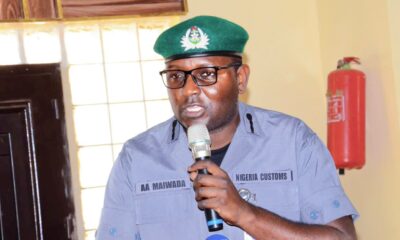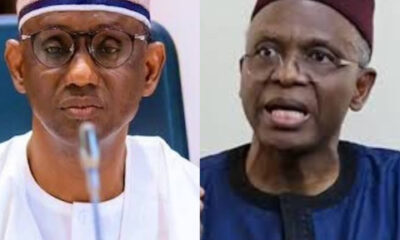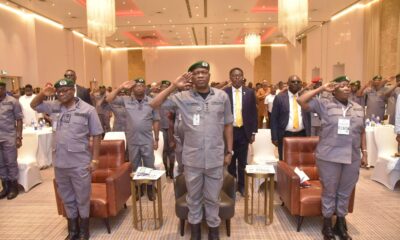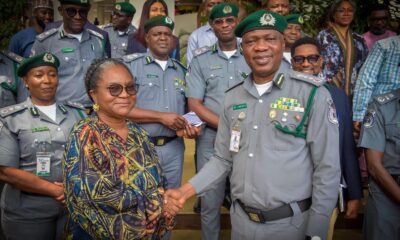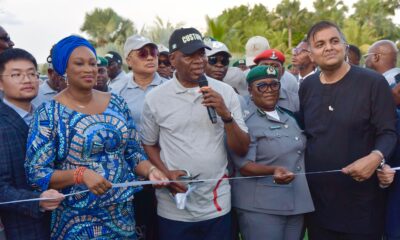Maritime
CTN: Stakeholders Fault FG Failure In Allocating Responsibility, Properly
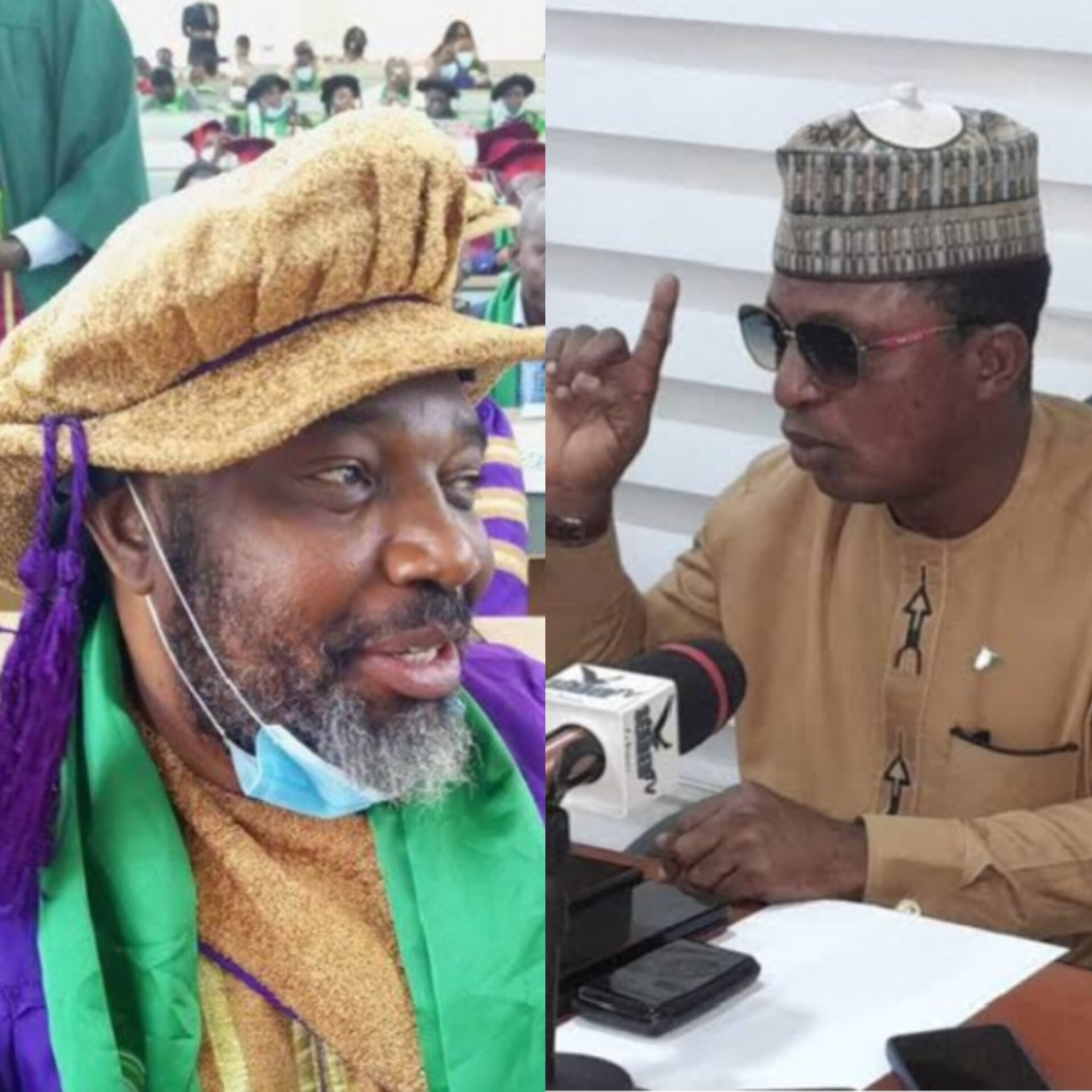
BY EGUONO ODJEGBA
Highly placed citizens including some within the corridors of power have in the past, occasionally lamented our lack of purposefulness either through our actions and or inactions, not only as shameful but identified some of the happenstances as part of our national tragedy.
Chief Audu Ogbe, a former Chairman of the then ruling Peoples’ Democratic Party (PDP) under President Olusegun ‘s government between 1999 and 2007 said the situation has almost completely eroded our collective values and national ethos.
In simply language, Ogbe said that whatever conforms to its culture or outlook is not only a partaker but a promoter of the evil. Whilst in other climes, criminal gangs and dubious individual citizens are the culprits, in Nigeria, our government which is also the custodian of our common fate and collective good is often the chief offender.
Thus successive governments in the past two decades through state officials have been known to engage in the morbid scheming and manipulation of the system with so much barefaced gut, arrogance and shamelessness, that the uninitiated find it extremely difficult to separate the bad from the good.
The evil which cuts across every segment of national life have found expressions in various government official acts, such as the case with a policy instrument in the nation’s port industry known as the Cargo Tracking Note (CTN).
Designed as an economic tool for the monitoring of compliance in respect of imported trade items, CTN is therefore one of the simple safety frameworks within the global trade corridor implemented by the customs administration of trading states.
Whereas the Nigeria Customs Service has successfully and satisfactorily carried out the CTN implementation through which most of its intelligence driving high profile seizures are made in collaboration with other international agencies, our appetite for corrupt and politically motivated duplication of tasks has seen the federal government make efforts to redistribute this function by bringing in other institutions of state.
But because the motive has been far from sincere the attempts since 2010 has suffered considerable pushback from stakeholders includimg the National Parliament;even though some smart, corrupt people with connection in the corridors of power have always found a way to bamboozle and sell the idea to the unwary government of the day.
The current traction which began in 2024 has as usual found apostles in certain quarters and who are sermonizing about the application of the CTN imperative, with uncanny, smooth, persuasive, intellectual depositions; citing names of countries supposedly on the train; while avoiding the costs implications on the economies of such nations.
Can the Nigerian economy which is already overtaxed afford the duplication of the CTN as presently been promoted by the present gang of enthusiasts adorned in national interest attire?
While efforts in the past to smuggle in the CTN through the Nigerian Ports Authority and the Nigerian Shippers Council (NSC) interchangeably has so far failed; the proponents who don’t take no for an answer appeared to have found some mileage with the President Bola Ahmed Tinubu government known for his system tax based philosophy which they are currently exploiting to the hilt.
As in the past, the Man Friday to execute the implementation is the Nigerian Shippers’ Council, believed to be logically acting on directive from above.
The issue assumed an interesting dimension last week when Fwdr Eugene Nweke Rff of Sea Empowerment and Research Center (SEREC), stirred the hornet’s nest by declaring that Nigeria stand to benefit substantially from the CTN implementation; even as he sought through a roundabout manner to deny that the instrument as presently designed has cost implication.
Nweke wonder why stakeholders are opposing the CTN based on concerns that it will further hurt the economy while feeling at home with other questionable taxes and rent within the port corridor, while providing a catalogue of the underhand taxes and payments.
In a position paper published by some online newspapers, Nweke said:
“Therefore, in the spate of these Chronicles of charges, if we are sincerely agitated about charges on importations that is killing the economy, then, it is the SEREC’s candid professional view and in the spirit of port value addition, to state that, if the ICTN implementation and the enforcement of 1% freight stabilization fee, will add value in the port, especially, by providing online tracking and imports statistics accuracy and by extension, position the Nigeria Shippers Council to promptly and adequately provide the requisite and desirous regulatory objectives, aimed to complement in setting and increasing performance indicators and compliance levels across board and thus, repositioning the port industry towards effectiveness, efficiency and competitiveness.
“It is in the strength of this mindset and understanding of the intending roles and benefits of integrating electronic cargo tracking in our port system, that, the Sea Empowerment and Research Center insists and call for the immediate implementation of the ICTN.
“And by the time the implementation fully runs through a period, the effects and contributions to the port system and its impact is felt by all, then, those who are initially in doubt of the effectiveness of the ICTN would have no option but to embrace and appreciate the enabling device (ICTN).”

Reacting however, Dr. Musa Segun, a Lagos based business tycoon and freight forward said that CTN as currently canvassed bothers on intellectual fraud and is inimical to the economy.
“I would like to put the record straight for academic exercise and future references. In whatever nomenclature, the cargo tracking note is captured or colourised it still remains an intellectual fraud, and I remembered vividly that you led the National Association of Government Approved Freight Forwarders (NAGAFF) team to the National Assembly over a decade ago to argue the need to cancel it for the same reasons l am putting forward.”
Going clinical with the definition of CTN, Segun provided a holistic transactional history of the tool and its importance through different regimes of import inspections carried out by the Nigeria Customs Service in the past eighteen years.
“It is an advisory document detailing the comprehensive information on the contents of the cargo and the movements of the same within the voyage or transit tenure. It could be electronically generated and transmitted or manually for the primary purpose of intelligence gathering for underdeveloped countries with no structural capacity to detect concealments in the freight or lack of well trained customs officers.
“What importance is cargo tracking note under destination inspection regime? The cargo tracking note is designed to support the intelligence gathering of underdeveloped nations with less capacity to effect comprehensive destination inspection.”
Vintage Segun revealed that countries with the expected capacity to run a modern destination inspection regime like Nigeria has no need to do an independent cargo tracking note.
“Record shows that there’s no country in the entire world using the modern destination inspection regime along with cargo tracking notes. The cargo tracking note was cancelled by the federal government through the National Assembly because we had migrated to the destination inspection regime, and our economy cannot afford unnecessary duplication of work that increases the cost of doing business in Nigeria.
“The promoters are faceless but powerful. Hence, they are identifying agencies and groups that could be used to lobby the government and confuse the general public. In my 35 years of post working and post qualifications experiences, I can conveniently say that cargo tracking notes are not alien to us in Nigeria.
“In the eighties till mid-90s, we call it a clean report of findings (CRF), which always accompany the Import duty report (IDR) before we pushed the government to encourage the reshipment agencies to consolidate it in compliance to international bess practices hence, the introduction of Clean Report of Inspection (CRI).
“As the world is advancing, we embraced the global trend of best practices and ensured our customs are well positioned to take charge. However, in testing our customs strength, we encouraged the pre-shipment inspection agencies to come and midwife our destination inspection regime so that the customs can conveniently understudy the modus operandi.
“Immediately, we became satisfied with the level of knowledge our customs officers have acquired during the joint exercise, we migrated the system from the agencies and saddle our indigenous customs to take full charge of the destination inspection with integrity.”
A Lagos grass root politician and former governorship aspirant, Segun enjoined professionals and agencies of the federal ministry of marine and blue economy to resist the temptations of seeking to make Nigeria a perpetual appendage of foreign technical interest groups.
“It is sad to see professionals making attempts to drag us backwards to the archaic days that often make us believe that it’s only the reports from abroad that have integrity and we can never do it right in Nigeria.
“It is also laughable seeing agencies deviate from their primary responsibilities to becoming marketing tools for private businesses to confuse the government of generating more revenue illegally due to the financial crisis the nation is going through.
“The government should be mindful of people coming with intellectual fraud ideas that could further destroy the economy we are trying to resuscitate.”
He enjoined citizens and the federal government to have faith in the ability of the Nigerian Customs Service to effectively manage the import and export regime without depending on unnecessary, affiliate affirmation of its capacity to deliver.
Collaborating Segun’s views, Mr. Okey Ibeke, Publisher, Business and Maritime West Africa described the CTN current push up as a desperate act of financial buccaneers.
“Cargo Tracking Note is simply a fraudulent project of some scavengers leveraging their closeness and connection to people in power, to foist additional hardship on Nigerians. Nigeria Customs Service is technically competent to track cargoes entering Nigeria.
“The Service has all the IT tools and highly trained personnel to track cargoes and they’ve been doing that through Suspicious Cargo Initiatives of some Regional Customs groups and World Customs Organisation. This initiative is to track cargoes under Customs control from the ports of loading to a final destination.”
In addition, Ibeke faulted the SEREC arguments that the present CTN is an advisory document that provides comprehensive information on the contents of the cargo and its movements during transit, and thus tailored to support the Nigeria Customs Service as misleading and fraudulent in all intents and purposes.



